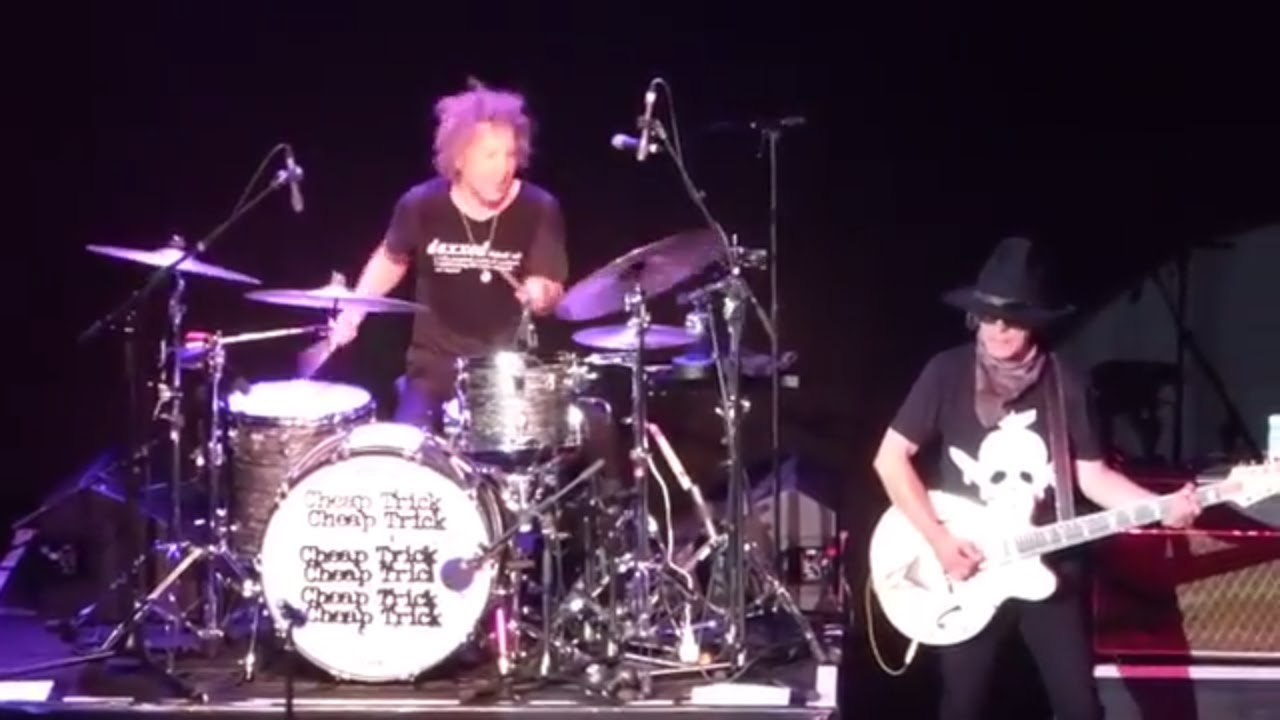Index
Cheap Trick: No "Surrender" After All These Years
Alongside Kiss in the 1970s, Cheap Trick enlivened the hard-rock scene with a tongue-firmly-in-cheek approach that showed the band quite willing and able to have serious fun. But Cheap Trick was, lyrically and musically, a much better band than Kiss, which had to rely upon Kabuki makeup and theatrics to distinguish itself from the hordes of garden-variety hard-rock acts.
Arguably, though, it was the saga of Kiss and the Rock and Roll Hall of Fame—amidst vehement resistance within the Nominating Committee, Kiss finally got onto a Rock Hall ballot in 2010 and was elected on its second try in 2014—that paved the way for Cheap Trick, eligible since 2003, to be elected to the Rock and Roll Hall of Fame on its ballot debut in 2016.
Still, along with its hard-rock chops, Cheap Trick also had a distinctive look; in rock critic Dave Marsh's deathless description, Cheap Trick was "the least likely looking combo of the day: vocalist Robin Zander and bassist Tom Petersson were rock-star slim and blown-dry, but guitarist/songwriter Rick Neilsen was a ringer for Huntz Hall of the Bowery Boys and drummer Bun E. Carlos looked like an overweight war criminal on the lam."
The front half of Cheap Trick: Lead guitarist Rick Neilsen (left) and singer-guitarist Robin Zander give the band its distinctive voices.
Even at age 69, Neilsen still looks like Hall, but Carlos no longer performs with the band, although Cheap Trick has kept the percussion work in-house. Taking Carlos's place on the drum riser is Neilsen's son Daxx, and if Rick Neilsen has been follicly-challenged throughout the years—thus explaining his ubiquitous billed cap—the younger Neilsen got his father's allotment of hair—his curly locks billow from either side of his head like Bozo the Clown's.
However, there is nothing clownish about Daxx's drumming, which faithfully re-creates Carlos's strong, solid beat, especially during the extended tom-tom thumping that opens "Ain't That a Shame." (Zander has also kept it in the family: His son Robin, Jr., lurked discreetly at stage left playing rhythm guitar.) Musical talent certainly runs in the Neilsen family: Rick's parents were both opera singers who owned a music store in Rockford, Illinois, and Rick himself was a drummer before he switched to guitar. Weaved into Cheap Trick's "ridiculous arabesques" (Marsh's description) is Neilsen's "astonishing guitar work" (Marsh again), and throughout Cheap Trick's set he didn't lose a step on those thunderous riffs and squalling leads and fills.
Neilsen is also, famously, a connoisseur collector of guitars, with an estimated 500 in his current stash, fifty of which he brought along on this current Nothing But a Good Time tour—and several of which got prominent display during the hour-long set as he changed guitars after every song, saving his trademark five-necked Hamer for the finale.
In the 1970s, Cheap Trick roared out of the gate with the albums Cheap Trick (Epic, 1976) and especially In Color (Epic, 1977) and Heaven Tonight (Epic, 1978), all of which featured songs that could be a little bit dark ("Auf Wiedersehen," "Heaven Tonight"), a little bit absurd ("He's a Whore," "Big Eyes"), and quite a bit inscrutable yet still oddly engaging. But Dream Police (Epic, 1979) fumbled for the Big Statement despite the success of the title track and the extended stomper "Gonna Raise Hell," and the band stumbled throughout the 1980s—although you might have forgotten about its ballsy "Reach Out," one of the highlights of the 1981 Heavy Metal film soundtrack—until 1988's Lap of Luxury (Epic) yielded the chart-topping power ballad "The Flame," which showed that the band had been picking up cues from Heart, Foreigner, and other Seventies refugees scrambling for relevance a decade later.
Another glossy ballad, "Can't Stop Fallin' into Love," from 1990's Busted (Epic), continued the slide into adult contemporary, and an attempt to arrest that slide following the band's departure from Epic, Woke up with a Monster (Warner Bros., 1994), featured a groaning title song that descended into self-parody, leaving "Can't Stop" as Cheap Trick's last entry in the Top 40 and relegating the band to nostalgia status, putting out product largely for the fanbase.
Cheap Trick's signature album may be 1979's Live at Budokan (Epic), the greatest live album recorded in Japan by a Western classic-rock hard-rock band not named Deep Purple, and one that still serves as the model for Cheap Trick's live sets, as demonstrated by the band's show at FivePoint.
The band indeed opened with "Hello There" and closed the set with "Goodnight Now," songs that framed Live at Budokan; they were two of the thirteen songs that drew overwhelmingly from Cheap Trick's glory period, although the band's latest released album (it is still working on an upcoming album), We're All Alright! (Big Machine, 2017), yielded "You Got It Going On" and "Long Time Coming," which Rick introduced as the band's latest single that has "spent 37 weeks at Number One . . . somewhere in South America." (Actually, Cheap Trick had released a new single, "The Summer Looks Good on You," just hours before it took the stage. And although it might not be "South America," "Long Time Coming" did spend "an unprecedented run of 18 weeks at #1 on the Mediabase Classic Rock chart.")
Both songs, particularly the latter, sounded like an encouraging return to form, but this was a crowd that expected to hear the classics. Did the band let them down? Hell, no—Cheap Trick delivered them in black-and-white checkerboarded spades.
After the coy greeting of "Hello There" came "Big Eyes," one of Neilsen's catchy but inscrutable efforts that still leaves me wondering why "Big Eyes" is such a "losing cause." Further down the line came "Baby Loves to Rock," from 1980's All Shook Up (Epic), which the band had recorded with producer George Martin. Sir George was of course effectively "the fifth Beatle" as he produced the Fab Four—and Cheap Trick's hooking up with him only underscored the Beatles' influence on the band, which often features Neilsen and Petersson executing note-perfect Beatle-esque harmonies behind Zander. (The body of one of Neilsen's guitars sported a Sgt. Pepper's-era photo of the Fab Four).
"Baby Loves to Rock" qualified as the rarity in the set—it's not the best-known song from All Shook Up—but before that came a pair of songs that are indeed very well-known to even casual Cheap Trick fans. Following "Big Eyes," the band kept the momentum going with the rowdy "California Man," geographically appropriate as this inaugural concert took place in California—and we'll get to the constant reminders that we were indeed in the Golden State soon enough—before Daxx began pounding the skins for another vintage rip through "Ain't That a Shame," a high point on the Budokan album and certainly one here.
Both songs, aside from long being concert staples for the band, emphasize Cheap Trick's homage to the rock and roll continuum. Our Woodstock forebears know that "Ain't That a Shame" was first a signature tune for one of rock's Founding Fathers, Antoine Domino, although we know him better as Fats. And it's not surprising that the founding members of Cheap Trick, having grown up listening to the foundational rock epitomized by the Rock and Roll Hall of Fame's inaugural Class of 1986, of which Fats Domino is indeed a member, would cotton to a cover of "Ain't That a Shame."
But Cheap Trick has a deeper understanding of rock and roll. "California Man" was not written by Neilsen or any other band member—it was penned by Roy Wood, a founding member of the Move, an English band that would disintegrate not too long after it released "California Man" as a single in 1972. In the United Kingdom, the Move rivaled only the Who and Small Faces as a Sixties Mod band, but it made almost no inroads in the US save for the perspicacious members of Cheap Trick.
Ironically, the Move's "California Man" even got eclipsed as a single—"Do Ya," one of the songs on the flip-side, proved more popular as it became the only Move song to chart on the US Billboard Hot 100, scraping to 93rd place. "Do Ya" was written by Jeff Lynne, who had joined the Move in its waning stages and later formed the Electric Light Orchestra from the ruins of the Move; ELO's version of "Do Ya" made it to Number 24 on the US Hot 100 in 1977, paving the way for ELO's eventual induction into the Rock and Roll Hall of Fame thirty years later.
Back at FivePoint, Cheap Trick continued to connect the rock and roll dots for fans. Following the extended solo by Petersson on his 12-string bass that came after "You Got It Going On," the band launched into an earnest cover of "I'm Waiting for the Man," the Velvet Underground's quintessential ode to scoring drugs, specifically, heroin, which, consciously or not, becomes a social statement of sorts given the current opioid epidemic in the US. (Speaking of drugs, as Californians voted to legalize marijuana in 2016, a law that did not become effective until this year, that sickly-sweet smell of sinsemilla seemed more prevalent than at recent concerts.) Petersson did the vocal honors for "I'm Waiting for the Man," and his gruff croak was certainly no worse than Lou Reed's gravelly vocal fifty years ago.
The back half of Cheap Trick: Neilsen's son Daxx now pounds the skins, but bassist Tom Petersson is still thundering after all these years.
As is true for many bands including Cheap Trick, some obligatory songs must be exactly that—obligatory. Zander strapped on the acoustic guitar for "The Flame," which hinted that time does catch up with all of us, and that included his voice on the only "mellow" one in the set. And though it was better suited for how he sounds now, Zander seemed blasé in his reading of "I Want You to Want Me," the band's only other Top Ten single, reaching the seventh spot in its live incarnation from Budokan back in 1979.
Yet Zander sounded reinvigorated as he belted out a rousing rendition of "Dream Police," which also lit a fire under the band—and that could only mean one thing: "Surrender." Originally included on Heaven Tonight, this inspired rocker, indisputably a classic-rock anthem, is one of the wackiest expressions of the rock and roll sensibility—or is that insensibility?—and it was the one song that got me up on my feet, dancing like a fool and singing like an idiot at the top of my lungs every blessed word. As Dave Marsh, writing in The New Rolling Stone Record Guide (1983), put it so memorably: "'Surrender' . . . is a gem: Neilsen's parents wig out behind their own advice to him and make out on the couch while listening to Kiss records. If that isn't your idea of surrender, you've wandered into the wrong book by mistake." Or, on this night, the wrong concert.
And, after "Goodnight Now," that was it. One hour of classic classic rock from Cheap Trick, a recent inductee into the Rock and Roll Hall of Fame but one that, even after 5000 concerts over its career, still felt the flame to perform. At least in Irvine this night.
Opening for Cheap Trick was Pop Evil, the Michigan-based alternative metal quintet fronted by Leigh Kakaly that released its first album, Lipstick on the Mirror (Universal Republic), in 2008 and is touring to support its latest album, Pop Evil (eOne Music, 2018). With a crunchy sound and a strong single in "Waking Lions," the band displayed influences from Alice in Chains and Rage Against the Machine, among others, although out-of-stater Kakaly made sure to give regular shout-outs to "California," which Poison's Bret Michaels seized upon eagerly . . .




Comments powered by CComment